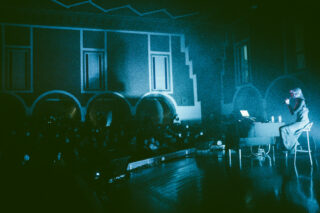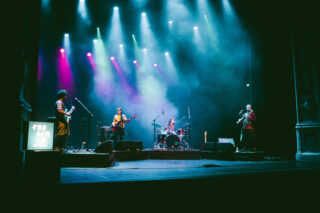Tremor festival: a world-class experimental music celebration in the middle of the Atlantic
Alabaster DePlume, Lyra Pramuk and more impress at an excellent-curated leftfield festival in the Azores

Alabaster DePlume, Lyra Pramuk and more impress at an excellent-curated leftfield festival in the Azores
“What do people do,” wonders saxophonist Alabaster DePlume aloud on the stage of a large, octagonal theatre in the island coastal town of Ponta Delgada, “if you don’t tell them what to do?”
Tremor festival, the underground cultural and artistic festival on São Miguel Island – the largest and most populous island in the Portuguese archipelago of the Azores – is not a bad way of answering that question. Now in its eighth year, the festival asks what a festival might do if it totally ignored industry buzz in its bookings, and sidestepped the conventions of modern city-wide festivals for instead creating a lineup that feels genuinely authored and utilised a succession of venues that’s more satisfying (often thrilling) than better vaunted festivals on a similar level in Europe.
Church bells ring out across previously quiet, cobbled streets as a couple of hundred music fans spill out onto the pavement and into the small bars where locals sip bottles of Super Bock. It’s a quiet suburban district, and we’ve all been told to meet here at 5pm. Ordinarily, secret performances are a red flag to this concert-goer (audiences have the right to pick who they wish to see) but this is something baked into Tremor. Avoiding a saturated lineup heavy with clashes, you can generally get to see each artist – or at least most of each artist – on the lineup. As such, when we are ushered into a school auditorium for the secret performance it comes without the stress of considering who you might have missed for this. As it turns out, it would have been worth missing other acts for – the eight piece jazz performance, an extended improvisation around Ornette Coleman’s 1982 School Work, is terrific. What this approach to booking also affords is greater trust in the programme and greater ability to absorb yourself in the work.
L’Eclair, performing in the large Coreto bar area, are a Swiss motorik group from Geneva that across five albums since 2017 have journeyed from cosmic prog to, tonight, something much tauter and more propulsive. Deviating from the straightforward psych-rock of their first couple of albums, the two percussionists (and lashings of cowbell) on stage tonight are testament to their shift to something close to mid-period Stereolab or the expansive, funkier Talking Heads lineups. This works a storm tonight. L’Eclair’s set is easily the most crowd-pleasing set of the weekend in terms of bodies dancing and drinks being spilled. And again, the venue is well chosen; tonight, most of the performances take place a short bus journey outside of town, where you can listen to talks on the future of Portuguese underground music, observe another area of the island and then dance to DJ Firmeza’s excellent set linking African kudoro and batida music to modern Portuguese club sounds (Nyege Nyege’s DJ set on the Saturday night is equally a dancefloor highlight).

Over at the Auditório Luís de Camões, a wood-panelled, gently modernist theatre on the edge of Ponta Dalgada’s coastline, Lyra Pramuk is letting in bursts of noise that illuminate like shards of light through a window. Pramuk lives in Berlin, but speaks with a laconic midwest American accent that gives her audience commands the feel of a self-help YouTube tutorial; she’s encouraging us to explore sound with her.
2020’s Fountain is a record where each of the sounds explored comes from the same origin place: Pramuk’s voice. It’s looped, treated and rendered to something that Pramuk correctly terms future folk. It’s close to Holly Herndon, late-era Björk, or even on the spectrum of Enya’s radical Celtic new age. Pramuk’s low moans and high twisted garbles eschew traditional lyrics for a kind of non-verbal sonic Esperanto; it’s staggeringly good, and works perfectly in a venue that befits serious immersion in the material. Reflecting Pramuk’s club culture roots, some sounds build and crescendo to ape the ecstatic moments of a good DJ set, but these are frequently trapdoored into something more ethereal.
Arriving onto São Miguel, the most common quip repeated by airport staff was that we might be arriving in spring but should look forward to enjoying all of the seasons during our stay, and this is undoubtedly true. Being in a particularly fussy Atlantic micro-climate, the island is susceptible to almost instantaneous bursts of rain or hail – some afternoons are swelteringly warm, but you may need to draw a cagoule with gunfire efficiency. This is something to be enjoyed rather than to be endured, and the festival is the subject of serious affection from its punters, which is not something you can say about many equivalent UK festivals. Anecdotally, it appears particularly popular with Portuguese and Spanish young people who listen to and read about plenty of global experimental music and are bored with their nation’s broader festival offers.

In the late 1960s, electronic pioneer Wendy Carlos helped popularise Robert Moog’s new instrument, famously working with Stanley Kubrick on A Clockwork Orange and The Shining, and releasing her own records like Switched On Bach, an electronic interpretation of the works of, you guessed it, Johann Sebastian Bach. Last year, US electronic jazz jam outfit supreme Bitchin Bajas held hands with this lineage in their Switched On Ra, an entirely electronic rendering of that most cosmic of jazz outliers, Sun Ra. Made using 19 vintage keyboards, a version of that set is being performed tonight. Cooper Crain, who is also guitarist/organist of the band Cave, as well as Dan Quinlivan and Rob Frye may be a modest spectacle – quite literally the three of them sat down looking amiable on various synths – but it’s one of the most moving, and sonically astounding, sets of the festival. As displayed in the Bajas’ terrific linkups with Natural Information Society and Bonnie ‘Prince’ Billy, they’re excellent collaborators, even if here the collaboration is with something more abstract like the source material of peak period 1960s Sun Ra. ‘Outer Spaceways Incorporated’ is a clear highlight, approximating a vocal line through a gorgeous vocoder performance that goes straight to the gut with its quivering digital baritone.
Based in Tottenham though primarily from France, MADMADMAD deliver the highest energy set of the weekend and are also one of its largest draws. A power trio who make an expansive, mutant no-wave, tonight’s performance showcases a band that in their handbrake turn tempo changes and fondness for dismantling their own sonic structures could be post-rock if they’d stop being quite so rock. Their self-released Proper Music in 2019 won attention from Erol Alkan and Gilles Peterson, and you can hear why.
Packed inside the Largo de Igreja do Colegio church (the best venue of the island, which is high praise indeed) are parents and families who might not normally be at an underground independent music festival. The Rabo de Peixe Music School is closely linked with the festival and a performance from that school band (presented as the festival’s resident group) with Rodrigo Amado is a serious delight. It is to the festival’s credit that it’s able to engage different parts of the island community, and indeed with the island’s heritage; the church itself is the extra third ingredient, providing a strange celestial echo to the wild clatter of the performance’s percussion.
Reflecting not only the quality of Tremor’s links with underground culture but the sanctuary it clearly provides to many of the punters, queer artists are central to the festival’s appeal. Trypas Corassao are actress and performer Tita Maravilha and producer/DJ Cigarra, and their set on the Thursday is a real highlight – straddling queer performance art, traditional Brazilian music and jungle. Perhaps the largest applause for any artist all weekend though is for As Docinhas. Having just released debut album XANDO, they take to the stage in assorted giant hats and fur boots and appear like a kind of hyperpop Roxy Music. With wailing saxophone and propulsive synth, their set is many things, but settles on a kind of glam stomp that often provides the illusion of them being a queer, Portuguese parallel to Fat White Family.

Coming on the weekend of the release of his career-best GOLD double album, returning to the mantra poetry of his earlier work rather than the (also excellent) instrumentals of his most recent To Cy & Lee album, is enigmatic Mancunian poet and saxophonist Alabaster DePlume. Coming up not through his home city but through Stoke Newington’s Total Refreshment Centre, DePlume is a shamanic presence who looks and speaks like a man one day away from forming a cult. This preacher energy, usually cringe in lesser performers, is utterly convincing and is the alchemy that turns DePlume into one of the UK’s most energising and communal live acts. DePlume performs globally with musicians taken from the region that he’s performing in, improvising around ideas primarily built from GOLD. At one point, he stands back and repeatedly incants “Give it to us, give it to us, give it to us.” In the multi-storey, octagonal-shaped theatre in the heart of Ponta Delgado, a large and diverse audience are rapt.
Tremor festival is a welcome deviation from a current British vogue for festival lineups that feel increasingly like throwing cake batter at a wall and seeing what sticks. The festival’s approach is holistic and feels communal in a way that is not just about attracting Arts Council funding. This is a rich, impressive festival where the programmers are clearly serious music fans running the festival for the right reasons; this can be hard to ascertain at a distance from European festivals, but Tremor is a source of serious inspiration.
Photography by Vera Marmelo